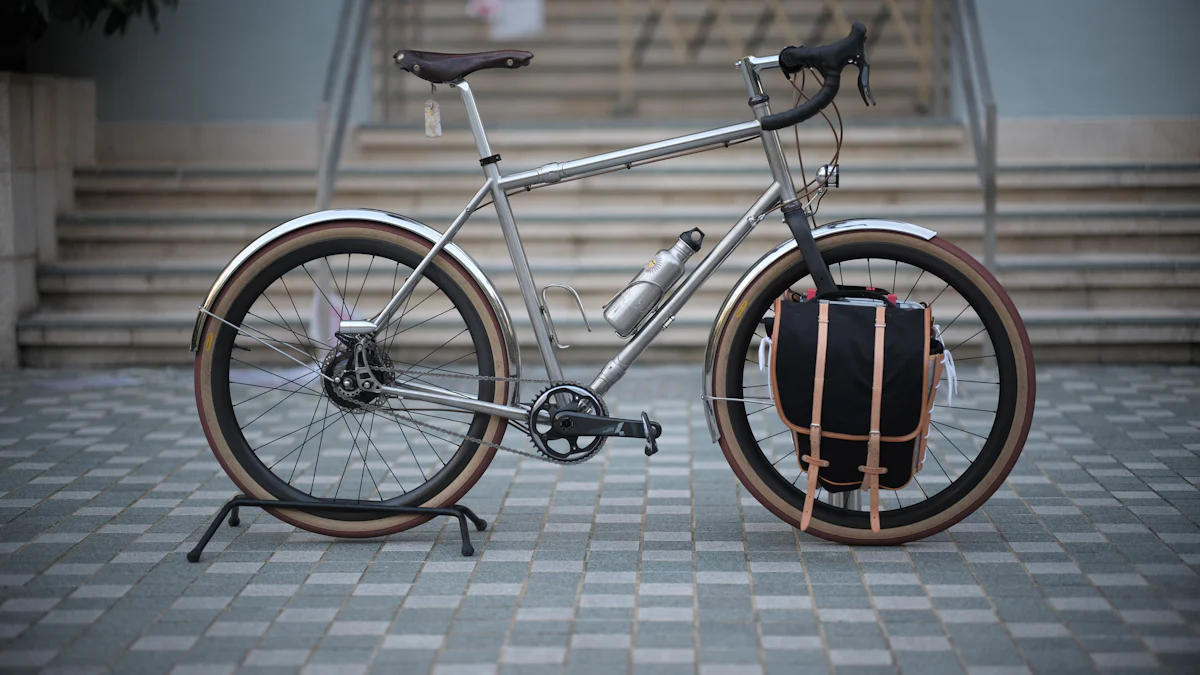
Titanium stands out as a premium material for bike frames, offering unmatched durability and resilience. Its lightweight nature makes it ideal for riders seeking speed without compromising strength. Unlike steel or aluminum, titanium resists corrosion, ensuring longevity even in harsh conditions. Cyclists often praise its unique ride quality, describing it as smooth and forgiving. Additionally, titanium frames are 40% lighter than steel, making them a top choice for performance enthusiasts. With its ability to combine strength, comfort, and low weight, many wonder: Is titanium best for bikes?
Key Takeaways
- Titanium bikes offer unmatched durability, making them a long-term investment for cyclists who prioritize longevity.
- With a weight that is 40% lighter than steel, titanium frames provide an agile and responsive ride, ideal for performance enthusiasts.
- Titanium’s natural resistance to corrosion ensures that your bike remains in top condition, requiring less maintenance over time.
- The unique ride quality of titanium frames absorbs vibrations, delivering a smooth and comfortable experience, especially on rough terrains.
- While titanium bikes are more expensive, their durability and low maintenance needs can justify the initial investment for serious riders.
- Repairing titanium frames can be challenging and costly, so consider your access to specialized services before purchasing.
- Limited availability of titanium bikes may restrict your options, so it’s essential to explore different brands and models that meet your needs.
Advantages of Titanium Bikes

Durability
Titanium offers unmatched durability for bike frames. Its strength ensures that it can withstand years of use without significant wear or damage. Unlike aluminum, which may dent under pressure, titanium resists impacts and maintains its structural integrity. Steel, while strong, is prone to rust over time. Titanium, on the other hand, remains unaffected by environmental factors, making it a long-lasting choice. Riders who prioritize longevity often find titanium frames to be a worthwhile investment.
Lightweight
Titanium strikes an impressive balance between strength and weight. It is 45% lighter than steel, yet it retains twice the strength of aluminum. This unique combination allows manufacturers to use less material without compromising performance. As a result, titanium bikes feel agile and responsive, especially during climbs or sprints. While carbon fiber is lighter, titanium provides a sturdier frame that doesn’t sacrifice ride quality. For those who value both speed and stability, titanium delivers an optimal solution.
Corrosion Resistance
One of titanium’s standout features is its natural resistance to corrosion. Unlike steel, which requires regular maintenance to prevent rust, titanium remains unaffected by moisture or salt exposure. This makes it an excellent choice for riders in coastal regions or areas with high humidity. Aluminum frames, though resistant to rust, can corrode over time due to oxidation. Titanium eliminates this concern entirely, ensuring that your bike maintains its appearance and performance for decades. This resilience adds to its reputation as a premium material for cycling enthusiasts.
Comfort
Titanium frames excel in delivering an unparalleled level of comfort. Their ability to absorb vibrations ensures a smoother ride, even on rough terrains. Unlike aluminum frames, which often transmit road shocks directly to the rider, titanium dampens these vibrations effectively. This quality makes long-distance rides less fatiguing and more enjoyable.
The material’s natural flexibility contributes significantly to its comfort. Titanium frames provide a “springy” feel that adapts to the road, offering a forgiving ride. This characteristic mirrors the smoothness of steel frames but with the added benefit of being lighter. Riders often describe the experience as balanced—stiff enough for performance yet compliant enough to reduce strain on the body.
“Titanium is known for being light, durable, comfortable, and compliant, offering a comfortable ride quality.”
For cyclists who prioritize comfort without sacrificing performance, titanium stands out. Its shock-absorbing properties make it ideal for various cycling activities, from casual rides to competitive events. Whether navigating uneven trails or cruising on paved roads, titanium ensures a consistent and enjoyable ride quality.
Disadvantages of Titanium Bikes
High Cost
Titanium bikes come with a hefty price tag. The material itself is rare and expensive to source, which drives up production costs. Manufacturers also face challenges in working with titanium due to its extreme strength. Specialized tools and skilled labor are necessary to shape and weld the frames, further increasing the overall expense. Compared to aluminum or steel bikes, titanium models often cost significantly more. For instance, while a high-quality steel bike may fit within a moderate budget, a titanium bike with similar specifications can easily double or triple the price.
The high cost makes titanium bikes less accessible for many riders. Cyclists on a tight budget may find it difficult to justify the investment, especially when other materials like aluminum or carbon fiber offer competitive performance at a lower price point. However, for those who value durability and long-term reliability, the initial expense of a titanium bike may feel worthwhile.
Difficulty in Repair
Repairing a titanium bike frame presents unique challenges. The material’s strength, while beneficial for durability, makes it difficult to work with during repairs. Welding titanium requires precision and expertise, as improper techniques can compromise the frame’s integrity. Not all bike shops have the necessary equipment or experience to handle titanium repairs, which limits options for riders in need of maintenance.
Additionally, repair costs for titanium bikes tend to be higher than for other materials. Aluminum and steel frames are easier to fix, with more widespread availability of repair services. In contrast, finding a qualified technician for titanium repairs may involve extra effort and expense. This difficulty can deter some cyclists from choosing titanium, especially those who frequently ride in rough conditions where damage is more likely.
Limited Availability
Titanium bikes are not as widely available as their aluminum, steel, or carbon counterparts. The production process for titanium frames is more complex and time-consuming, which limits the number of manufacturers specializing in this material. As a result, the selection of titanium bikes in the market remains relatively small. Riders looking for specific designs or features may struggle to find a titanium model that meets their needs.
The limited availability also affects customization options. While steel and aluminum bikes often come in a variety of styles and sizes, titanium models may offer fewer choices. This scarcity can make it challenging for cyclists to find a bike that fits their preferences or riding style. For those wondering, “Is titanium best for bikes?” the restricted availability might be a deciding factor against it.
“Titanium bikes are more expensive but offer durability, lightweight, and resistance to corrosion and rusting.”
Despite these disadvantages, titanium remains a top-tier material for bike enthusiasts who prioritize quality and longevity. However, understanding these limitations is crucial before making a purchase decision.
Comparison with Other Materials

Titanium vs. Aluminum
When comparing titanium to aluminum, the differences become clear in terms of strength, durability, and ride quality. Titanium frames are twice as strong as aluminum, which means they can handle more stress and wear over time. Aluminum, while lightweight, tends to fatigue faster and is more prone to dents or damage from impacts. Titanium, on the other hand, resists these issues, making it a long-term investment for serious cyclists.
In terms of weight, aluminum is lighter than titanium. However, titanium compensates with its superior strength-to-weight ratio. This allows manufacturers to use thinner tubing, resulting in a frame that feels agile yet sturdy. Aluminum bikes often feel stiff, which can lead to a harsher ride. Titanium’s natural flexibility absorbs vibrations, offering a smoother and more comfortable experience.
For riders seeking an affordable option, aluminum wins due to its lower cost. However, if you value durability, comfort, and longevity, titanium stands out as the better choice.
Titanium vs. Carbon Fiber
The debate between titanium and carbon fiber often centers on performance and ride quality. Carbon fiber is lighter than titanium, making it a favorite for competitive cyclists who prioritize speed. However, titanium offers unmatched durability. While carbon fiber frames can crack under high stress or impact, titanium frames withstand wear and tear with ease. Most damage to titanium is superficial and repairable, whereas carbon fiber often requires complete replacement.
Ride quality also differs significantly. Carbon fiber provides a rigid and efficient ride, which some riders prefer for racing. Titanium, however, delivers a more forgiving and springy feel, absorbing road vibrations effectively. This makes titanium ideal for long-distance rides or rough terrains where comfort is essential.
Cost is another factor to consider. Both materials are expensive, but titanium’s longevity often justifies the higher initial investment. For those wondering, Is titanium best for bikes?, the answer depends on whether you prioritize durability and comfort over weight savings and stiffness.
Titanium vs. Steel
Steel has long been a popular choice for bike frames due to its strength and classic ride quality. However, titanium surpasses steel in several key areas. Titanium is 45% lighter than steel, making it a better option for riders who want a lightweight yet durable frame. Steel frames, while strong, are prone to rust and require regular maintenance. Titanium’s corrosion resistance eliminates this concern entirely, ensuring a bike that lasts for decades with minimal upkeep.
In terms of ride quality, both materials offer a smooth and comfortable experience. However, titanium’s ability to absorb shocks gives it an edge, especially on uneven surfaces. Steel frames can feel heavier and less responsive during climbs or sprints, whereas titanium maintains agility without sacrificing strength.
Cost is where steel has the advantage. It is significantly cheaper than titanium, making it accessible to a wider range of cyclists. However, for those who value a lightweight, rust-resistant, and nearly indestructible frame, titanium proves to be worth the investment.
Who Should Choose Titanium?
Riders Seeking Durability
I often recommend titanium bikes to riders who prioritize durability above all else. Titanium frames excel in withstanding the test of time. Unlike aluminum, which can fatigue and dent, or steel, which risks rusting, titanium remains resilient. Its natural strength ensures that it can endure years of heavy use without significant wear. For cyclists who frequently ride on rough terrains or in challenging weather conditions, titanium offers unmatched reliability.
Many riders I’ve spoken to value the peace of mind that comes with a titanium frame. They know their bike can handle the unexpected—whether it’s a sudden impact or exposure to harsh elements. If you’re someone who wants a bike that lasts for decades with minimal maintenance, titanium is a top contender.
“Titanium frames are ten times stronger and longer-lasting than carbon frames, making them a durable option for cyclists.”
Cyclists Prioritizing Comfort
Comfort plays a crucial role in the cycling experience, especially for long-distance riders. Titanium frames stand out for their ability to absorb road vibrations. This quality ensures a smoother ride, even on uneven surfaces. Unlike aluminum, which often transmits shocks directly to the rider, titanium dampens these impacts effectively. I’ve found that this makes a significant difference during extended rides, reducing fatigue and enhancing overall enjoyment.
The material’s natural flexibility also contributes to its comfort. Titanium provides a “springy” feel that adapts to the road, offering a forgiving ride. Riders often describe it as a perfect balance—stiff enough for performance yet compliant enough to reduce strain on the body. If you value a bike that prioritizes your comfort without compromising on performance, titanium is an excellent choice.
“Titanium is known for being light, durable, comfortable, and compliant, offering a comfortable ride quality.”
Budget Considerations
While titanium offers numerous advantages, its high cost can be a deciding factor. I always advise riders to consider their budget carefully before investing in a titanium bike. The material’s rarity and the specialized manufacturing process make it one of the most expensive options on the market. For those with limited funds, aluminum or steel may provide a more affordable alternative.
However, I’ve noticed that many cyclists view titanium as a long-term investment. Its durability and resistance to corrosion mean fewer repairs and replacements over time. If you’re willing to pay more upfront for a bike that lasts for decades, titanium can be a cost-effective choice in the long run. On the other hand, if your budget is tight, exploring other materials might be more practical.
“Titanium bikes are more expensive but offer durability, lightweight, and resistance to corrosion and rusting.”
Ultimately, the question of Is titanium best for bikes? depends on your priorities. If durability, comfort, and long-term value align with your needs, titanium could be the ideal material for your next bike.
Titanium frames deliver exceptional durability, lightweight performance, and corrosion resistance. They excel in comfort, offering a smooth ride that absorbs shocks effectively. For serious cyclists, titanium provides a long-term investment due to its strength and ability to withstand wear and tear. However, the high cost and limited availability may not suit every rider. Choosing the right material depends on your priorities and budget. So, when asking yourself, Is titanium best for bikes?, consider your specific needs and riding goals to make the best decision.
FAQ
Should I buy a titanium bike?
This depends on your cycling goals and preferences. Titanium bikes excel in durability, comfort, and corrosion resistance. If you value a smooth ride and want a bike that lasts for decades, titanium is a great choice. However, the high cost might not suit everyone. I recommend considering your budget and riding needs before making a decision. For competitive cyclists or those who ride frequently, the investment often pays off in the long run.
What are the best titanium bicycles?
The best titanium bicycles come from brands known for their craftsmanship and expertise. Companies like Moots, Lynskey, and Litespeed have built strong reputations in the cycling world. These manufacturers focus on quality, ensuring their frames deliver exceptional performance and comfort. When choosing a titanium bike, look for models that match your riding style—whether it’s road cycling, gravel riding, or mountain biking. Always test ride if possible to find the perfect fit.
How does titanium compare to other materials?
Titanium stands out for its unique combination of strength, lightweight properties, and comfort. Compared to aluminum, it offers better durability and a smoother ride. Against carbon fiber, titanium wins in longevity and resilience. When compared to steel, it provides similar comfort but with less weight and no risk of rust. Each material has its strengths, but titanium offers a balanced package for riders seeking performance and reliability.
Are titanium bikes worth the high cost?
For many cyclists, titanium bikes justify their price due to their durability and low maintenance needs. While the upfront cost is high, the long lifespan of titanium frames often offsets this expense. Riders who prioritize quality and long-term value find titanium bikes to be a worthwhile investment. However, if you’re on a tight budget, exploring other materials like aluminum or steel might be more practical.
Can titanium bikes be repaired?
Yes, titanium bikes can be repaired, but the process requires specialized skills and equipment. Welding titanium demands precision, and not all bike shops offer this service. Repairs can be expensive, so I recommend taking good care of your bike to minimize the need for fixes. Despite these challenges, the durability of titanium means repairs are rarely needed compared to other materials.
Do titanium bikes require special maintenance?
Titanium bikes require minimal maintenance compared to steel or aluminum. The material resists corrosion, so you don’t need to worry about rust. Regular cleaning and occasional checks for wear and tear are usually enough to keep your bike in top condition. I suggest inspecting the frame and components periodically to ensure everything functions smoothly.
Are titanium bikes suitable for beginners?
Titanium bikes can be an excellent choice for beginners who want a long-lasting and comfortable ride. However, the high cost might deter new riders who are still exploring their cycling interests. If you’re serious about cycling and plan to ride frequently, investing in a titanium bike could save you money in the long term. For casual riders, more affordable options like aluminum might be a better starting point.
Why are titanium bikes less common?
The production process for titanium frames is complex and time-intensive. This limits the number of manufacturers specializing in titanium bikes. Additionally, the high cost of the material makes these bikes less accessible to the average rider. Despite their rarity, titanium bikes remain a top choice for enthusiasts who value quality and performance.
What type of rider benefits most from a titanium bike?
Riders who prioritize durability, comfort, and long-term value benefit most from titanium bikes. These frames suit cyclists who tackle rough terrains, ride long distances, or face challenging weather conditions. Competitive riders and those who want a bike that lasts for decades often choose titanium. If you value a smooth and reliable ride, titanium could be the ideal material for you.
How long do titanium bikes last?
Titanium bikes can last a lifetime with proper care. The material’s resistance to corrosion and fatigue ensures it remains strong and functional for decades. Many riders consider titanium frames to be a one-time investment due to their longevity. Regular maintenance and careful handling will help maximize the lifespan of your bike.

